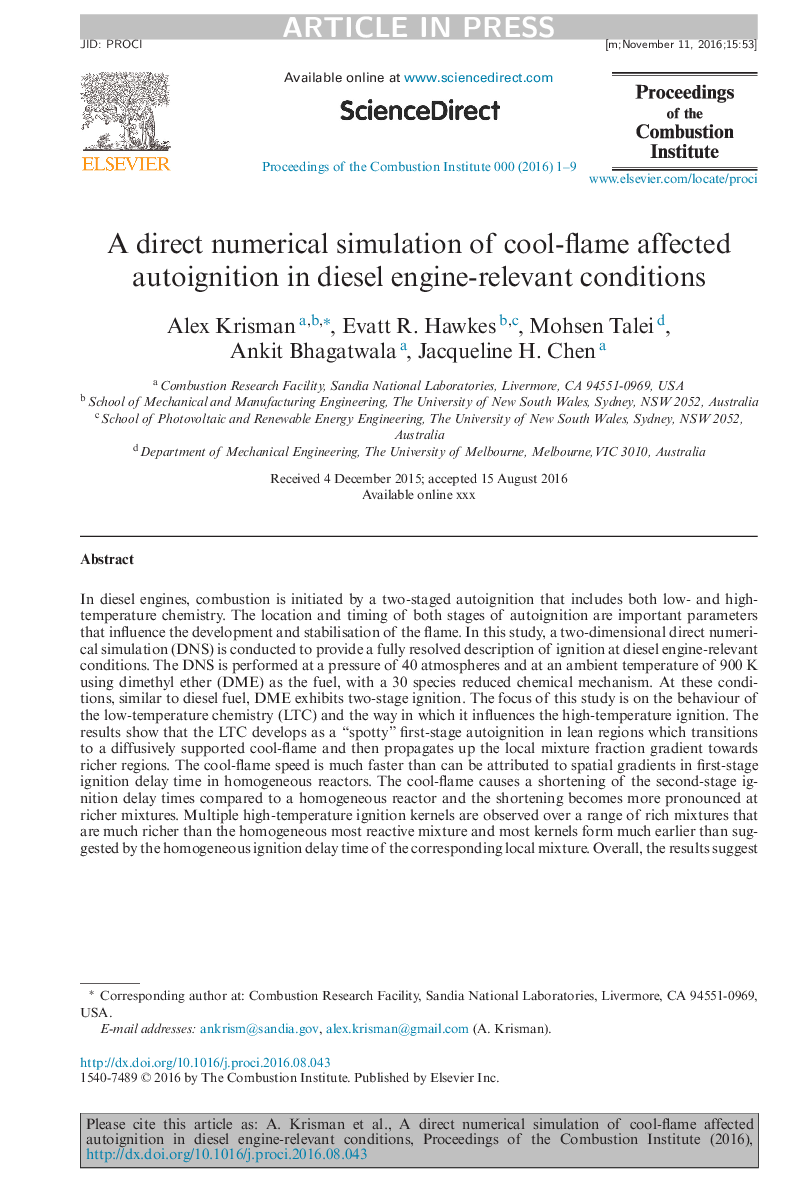| کد مقاله | کد نشریه | سال انتشار | مقاله انگلیسی | نسخه تمام متن |
|---|---|---|---|---|
| 4915412 | 1427915 | 2017 | 9 صفحه PDF | دانلود رایگان |
عنوان انگلیسی مقاله ISI
A direct numerical simulation of cool-flame affected autoignition in diesel engine-relevant conditions
ترجمه فارسی عنوان
شبیه سازی عددی مستقیم از شعله با هوا در شرایط مرتبط با موتور دیزل تاثیر می گذارد
دانلود مقاله + سفارش ترجمه
دانلود مقاله ISI انگلیسی
رایگان برای ایرانیان
کلمات کلیدی
خودمختاری، شبیه سازی مستقیم عددی، شعله داغ، شیمی درجه حرارت پایین، ضریب دما منفی،
موضوعات مرتبط
مهندسی و علوم پایه
مهندسی شیمی
مهندسی شیمی (عمومی)
چکیده انگلیسی
In diesel engines, combustion is initiated by a two-staged autoignition that includes both low- and high-temperature chemistry. The location and timing of both stages of autoignition are important parameters that influence the development and stabilisation of the flame. In this study, a two-dimensional direct numerical simulation (DNS) is conducted to provide a fully resolved description of ignition at diesel engine-relevant conditions. The DNS is performed at a pressure of 40 atmospheres and at an ambient temperature of 900Â K using dimethyl ether (DME) as the fuel, with a 30 species reduced chemical mechanism. At these conditions, similar to diesel fuel, DME exhibits two-stage ignition. The focus of this study is on the behaviour of the low-temperature chemistry (LTC) and the way in which it influences the high-temperature ignition. The results show that the LTC develops as a “spotty” first-stage autoignition in lean regions which transitions to a diffusively supported cool-flame and then propagates up the local mixture fraction gradient towards richer regions. The cool-flame speed is much faster than can be attributed to spatial gradients in first-stage ignition delay time in homogeneous reactors. The cool-flame causes a shortening of the second-stage ignition delay times compared to a homogeneous reactor and the shortening becomes more pronounced at richer mixtures. Multiple high-temperature ignition kernels are observed over a range of rich mixtures that are much richer than the homogeneous most reactive mixture and most kernels form much earlier than suggested by the homogeneous ignition delay time of the corresponding local mixture. Overall, the results suggest that LTC can strongly influence both the timing and location in composition space of the high-temperature ignition.
ناشر
Database: Elsevier - ScienceDirect (ساینس دایرکت)
Journal: Proceedings of the Combustion Institute - Volume 36, Issue 3, 2017, Pages 3567-3575
Journal: Proceedings of the Combustion Institute - Volume 36, Issue 3, 2017, Pages 3567-3575
نویسندگان
Alex Krisman, Evatt R. Hawkes, Mohsen Talei, Ankit Bhagatwala, Jacqueline H. Chen,
